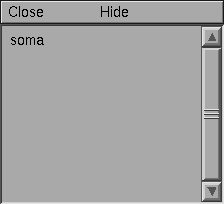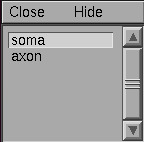SectionBrowser
- class SectionBrowser
- Syntax:
sb = n.SectionBrowser()sb = n.SectionBrowser(SectionList)- Description:
Class that makes a visible list of all section names. If the optional SectionList arg is present then only those section names are shown in the browser.
Example:
from neuron import n, gui soma = n.Section('soma') dend = n.Section('dend') sl = n.SectionList([soma]) # only the soma will be shown sb = n.SectionBrowser(sl)

See also
- Syntax:
sb = new SectionBrowser()sb = new SectionBrowser(SectionList)- Description:
Class that makes a visible list of all section names. If the optional SectionList arg is present then only those section names are shown in the browser.
See also
SectionList, hoc_stdrun_shape
- SectionBrowser.select()
- Syntax:
.select(sec=section)- Description:
specified section is highlighted.
Example:
from neuron import n, gui soma = n.Section('soma') axon = n.Section('axon') sb = n.SectionBrowser() sb.select(sec=axon)

- Syntax:
.select()- Description:
currently accessed section is highlighted.
Example:
create soma create axon objref sb sb = new SectionBrowser() axon sb.select()

- SectionBrowser.select_action()
- Syntax:
sb.select_action(python_func)- Description:
A Python function is executed when an item is selected (single click or dragging) by the mouse. Before execution, the selected section is pushed. (and popped after the function completes.) A Python function is executed in the object context in which
select_actionregistered it.
Example:
from neuron import n, gui soma = n.Section('soma') axon = n.Section('axon') def select(sec): print(f'select: {sec} {type(sec)}') def accept(sec): print(f'accept: {sec}') sb = n.SectionBrowser() sb.select_action(select) sb.accept_action(accept)
Note
Python support for
select_action()was added in NEURON 7.5.- Syntax:
sb.select_action("command")- Description:
Command is executed when an item is selected (single click or dragging) by the mouse. Before execution, the selected section is pushed. (and popped after the command completes.) Command is executed in the object context in which
select_actionregistered it.
Example:
begintemplate Cell public soma, dend, axon create soma, dend[3], axon endtemplate Cell objref sb, cell[3] for i=0,2 cell[i] = new Cell() sb = new SectionBrowser() sb.select_action("act()") proc act() { printf("currently accessed section is %s\n", secname()) }
- SectionBrowser.accept_action()
- Syntax:
sb.accept_action(python_func)- Description:
A Python function is executed when an item is accepted (double click) by the mouse. Before execution, the selected section is pushed. (and popped after the function completes.) A Python function is executed in the object context in which the
accept_actionregistered it.
Example:
from neuron import n, gui soma = n.Section('soma') axon = n.Section('axon') def select(sec): print(f'select: {sec} {type(sec)}') def accept(sec): print(f'accept: {sec}') sb = n.SectionBrowser() sb.select_action(select) sb.accept_action(accept)
Note
Python support for
accept_action()was added in NEURON 7.5.- Syntax:
sb.accept_action("command")- Description:
Command is executed when an item is accepted (double click) by the mouse. Before execution, the selected section is pushed. (and popped after the command completes.) Command is executed in the objet context in which the
accept_actionregistered it.
Example:
create soma, dend[3], axon objref sb sb = new SectionBrowser() sb.accept_action("act()") proc act() { printf("currently accessed section is %s\n", secname()) }